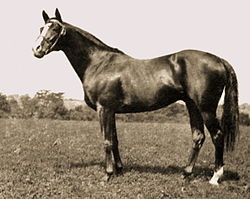Epinard
| Épinard | |
|---|---|
| Sire | Badajoz |
| Grandsire | Gost |
| Dam | Épine Blanche |
| Damsire | Rock Sand |
| Sex | Stallion |
| Foaled | 1920 |
| Country | France |
| Colour | Chestnut |
| Breeder | Pierre Wertheimer |
| Owner | Pierre Wertheimer |
| Trainer | H. Eugene Leigh |
| Record | 20:12-6-0 |
| Earnings | £1,285 plus 376,975 fr |
| Major wins | |
|
Prix Yacowlef (1922) Prix des Coteaux (1922) Grand Criterium (1922) Prix de la Forêt (1922) Critérium de Maisons-Laffitte (1922) Prix d'Ispahan (1923) Prix du Gros Chêne (1923) Stewards' Cup (1923) |
|
| Awards | |
| French Champion 2-Year-Old Male Horse (1922) U.S. Champion Older Male Horse (1924) |
|
| Last updated on 28 September 2011 | |
Épinard (1920–1942) was a French Thoroughbred racehorse which was given the French name for spinach. He is considered a racing legend by French racing authority France Galop.
He was a chestnut stallion sired by Badajoz from Epine Blanche by the British Triple Crown winner Rock Sand. Epine Blanche was conceived in the U.S.A. and foaled in France. She was out of an American mare named White Thorn by Nasturtium, who was a brilliant two-year-old. Epine Blanche was also the dam of the race winner Epinette III by Mont Bernina. Épinard was inbred to the undefeated racehorse, St. Simon in the third and fourth generation (4m x 4f).
Owned and bred by one of France's leading horsemen, Pierre Wertheimer, Épinard made his racing debut at two by winning the Prix Yacowlef at the Deauville Racecourse. He dominated his age group in France, winning four important races and earning 1922 champion honours. As a three-year-old, he continued to win in France before being sent to compete in England. At the Goodwood Racecourse near Chichester, he won the 1923 Stewards' Cup, defeating a strong field including Pharos. After conceding a great deal of weight, he finished second by a neck to Verdict in the Cambridgeshire Handicap.
In October 1923, Epsom Derby winner Papyrus was sent to the United States to compete in a much- ballyhooed match race against Kentucky Derby winner Zev. After the American horse easily won, the following year the racing world began to talk about Épinard taking on America's best. Following negotiations with leading American horsemen August Belmont, Jr., James Shevlin, and Matt Winn, Wertheimer agreed to send Épinard to compete in a series of three American races billed as the International Special.
...
Wikipedia

